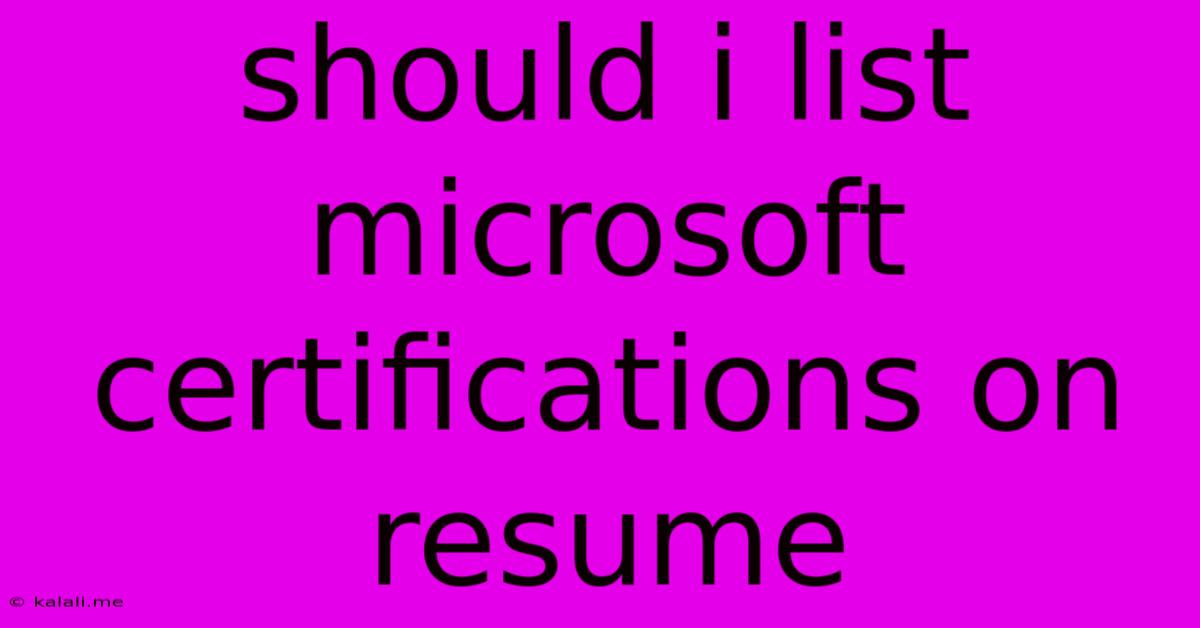Should I List Microsoft Certifications On Resume
Kalali
Jun 06, 2025 · 3 min read

Table of Contents
Should I List Microsoft Certifications on My Resume? A Comprehensive Guide
Should you include your Microsoft certifications on your resume? The short answer is: it depends. While not always a guaranteed boost, strategically showcasing relevant certifications can significantly enhance your resume's impact, particularly for certain roles. This guide will help you determine whether listing your Microsoft certifications is the right move for your resume.
This article will explore the factors to consider when deciding whether or not to list your Microsoft certifications, focusing on the impact on your resume's effectiveness and overall career prospects. We will delve into which certifications are most valuable, how to present them effectively, and when it might be best to omit them.
When to Include Microsoft Certifications on Your Resume
Including Microsoft certifications can be beneficial in several scenarios:
-
Targeting Specific Roles: If the job description explicitly mentions specific Microsoft certifications (e.g., Microsoft Certified: Azure Solutions Architect Expert, Microsoft Certified: Azure Developer Associate, Microsoft 365 Certified: Modern Desktop Administrator Associate), listing them is a strong move. It demonstrates you possess the required skills and knowledge. This directly addresses the employer's needs, showcasing your preparedness.
-
Highlighting Technical Skills: For roles heavily reliant on Microsoft technologies (e.g., system administrator, cloud engineer, data analyst), certifications validate your proficiency. They provide concrete evidence of your expertise beyond just listing skills. Consider the role's requirements; if the job description emphasizes cloud computing, showcasing your Azure or Microsoft 365 certifications is crucial.
-
Boosting Early-Career Resumes: If you're a recent graduate or early in your career with limited work experience, certifications can fill the gap. They show initiative, commitment to professional development, and a dedication to mastering relevant technologies. Think of them as demonstrable proof of your skills.
-
Demonstrating Continuous Learning: In the ever-evolving tech landscape, certifications signal your commitment to staying updated with the latest technologies and industry best practices. This is particularly valuable for roles requiring continuous learning and adaptation.
-
Differentiating Yourself from the Competition: In competitive job markets, certifications can help your resume stand out. They add a layer of credibility and demonstrate a higher level of commitment compared to candidates who haven't pursued them.
Which Certifications Matter Most?
Not all Microsoft certifications carry the same weight. Prioritize listing certifications that are:
- Industry-Recognized: Focus on well-known and widely respected certifications.
- Role-Specific: Choose certifications directly relevant to the job you're applying for.
- Recently Obtained: More recent certifications demonstrate current knowledge and skills.
- Advanced Level: Advanced-level certifications hold more value than fundamental ones.
Consider the specific requirements of the job description when selecting which certifications to highlight. A general certification might be less impactful than a specialized one relevant to the role.
How to Effectively Present Your Certifications on Your Resume
-
Dedicated Section: Create a separate "Certifications" section on your resume, usually after your "Skills" or "Experience" sections.
-
Clear Formatting: Use a consistent format for listing certifications. Include the certification name, issuing body (Microsoft), and the date of achievement.
-
Keep it Concise: Avoid lengthy descriptions; focus on the key information.
-
Relevance is Key: Only list certifications relevant to the job you are applying for. Don't clutter your resume with irrelevant certifications.
When to Omit Microsoft Certifications
There are instances where including certifications might not be beneficial:
-
Irrelevant to the Role: If the job doesn't require any specific Microsoft expertise, including certifications might dilute the impact of your other qualifications.
-
Outdated Certifications: Certifications that are significantly outdated might suggest a lack of current knowledge. Consider updating them or omitting them entirely.
-
Overcrowded Resume: If your resume is already quite lengthy, you might need to prioritize other sections, such as experience or projects.
Conclusion
The decision of whether or not to list your Microsoft certifications on your resume hinges on careful consideration of the specific job requirements, your career stage, and the overall impact on your resume's effectiveness. By strategically showcasing relevant and up-to-date certifications, you can strengthen your candidacy and significantly improve your chances of securing an interview. Remember to prioritize relevance and clarity to maximize the positive impact of your certifications on your job search.
Latest Posts
Latest Posts
-
How To Clean Vinyl Siding Without Scrubbing
Jun 07, 2025
-
Why Is My Car Jerking When I Drive
Jun 07, 2025
-
Bible Verse A Cord Of Three Strands
Jun 07, 2025
-
Light Switch And Outlet Wiring Diagram
Jun 07, 2025
-
How To Delete Text On Android
Jun 07, 2025
Related Post
Thank you for visiting our website which covers about Should I List Microsoft Certifications On Resume . We hope the information provided has been useful to you. Feel free to contact us if you have any questions or need further assistance. See you next time and don't miss to bookmark.